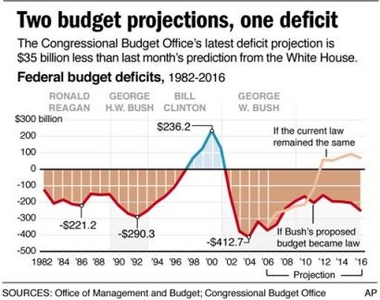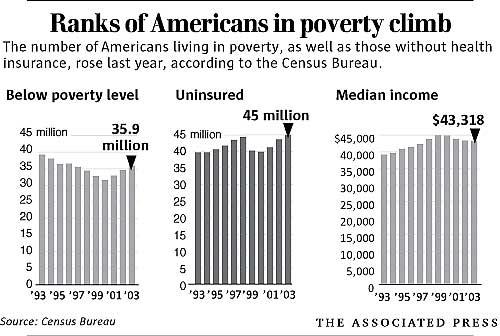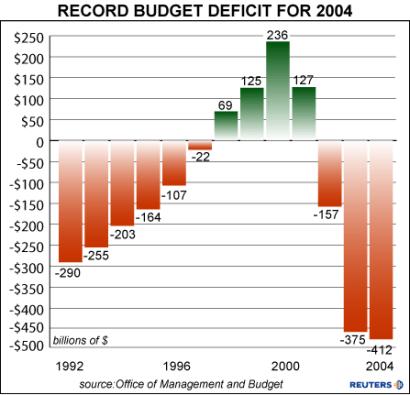How Is Bush Doing?


422 BILLION DEFICIT This Year AloneThank You Republician Right
"Only George W. Bush could celebrate over a record budget deficit of $422 billion, a loss of 1.6 million jobs and Medicare premiums that are up by a record 17 percent, "W stands for wrong — the wrong direction for America." John F. Kerry By PETE YOST, Associated Press Writer 9/7/4
Worst President EVER? He has taken the country into an unwinnable war and alienated friend and foe alike in the process; He is bankrupting the country with a combination of aggressive military spending and reduced taxation of the rich; He has deliberately and dangerously attacked separation of church and state; He has repeatedly "misled," to use a kind word, the American people on affairs domestic and foreign; He has proved to be incompetent in affairs domestic and foreign Iraq and the battle against al-Qaida; He has sacrificed American employment (including the toleration of pension and benefit elimination) to increase overall productivity; He is ignorantly hostile to science and technological progress; He has tolerated or ignored one of the republic's oldest problems, corporate cheating in supplying the military in wartime.

1.6 MILLIONS JOBS LOST SINCE BUSH TOOK OFFICE SOURCE: US BUREAU OF LABOR
Unemployment Stands at 5% (1% Higher than Clinton's Last Year.) 8.2 Million Americans are without Jobs 2 Million without jobs for 27 WEEKS or MORE. SOURCE: US BUREAU OF LABORAMERICANS WITHOUT HEALTH INSURANCE?
45 MILLION THATS AN INCREASE OF 5.5% SINCE JAN 20TH, 2001 SOURCE: U.S. CENSUS BUREAUAMERICANS Living In Poverty
36 MILLION The poverty rate for 2003 is 12.5 up another 1.3 million Americans. The poverty rate was 12.1 percent in the year (2002), Up from 11.7 in 2002. Median household income declined 1.1 percent between 2001 and 2002. The poverty rate rose again after having fallen for nearly a decade to 11.3% (It's lowest level for more than 25 years) in 2000. In 2002 12.1 million children were in poverty. SOURCE: U.S. CENSUS BUREAUMeals on wheels
George Says... "I hope people around this country realize that agencies such as this food bank need money." - Bush, 12/19/02George Does... The 2003 and 2004 Bush budgets proposes to freeze the Congregate Nutrition Program, which assists local soup kitchens and meals on wheels programs. With inflation, this proposal would mean at least 36,000 seniors would be cut from meals on wheels and congregate meals programs. Currently, 139,000 seniors are already on waiting lists for home-meal programs. His 2004 budget continues the freeze.Labor
George Says.... Our workers are the most productive, the hardest working, the best craftsmen in the world. And I'm here to thank all those who work hard to make a living here in America. Bush, 9/2/02 George Does... Bush’s 2003 Budget proposed a 9% ($476 million) cut to job training programs and a 2% ($8 million) cut to the Occupational Safety and Health Administration. Similarly, his 2004 budget proposes a $60 million cut to adult job training programs and a total elimination of the Youth Opportunities Grants, which provide job training to younger workers.Home Ownership
George Says.... "Part of being a secure America is to encourage homeownership." George Does... According to AP, President Bush's proposed 2004 budget for the U.S. Department of Housing and Urban Development, announced Monday, phases out HOPE VI the program Bush visited and touted in Atlanta. Renee Glover, executive director of the Atlanta Housing Authority said. ‘We didn't anticipate that HOPE VI would be eliminated. AP, 2/5/2003Children’s Hospitals
George Says.... This is a hospital, but it's also - it's a place full of love. And I was most touched by meeting the parents and the kids and the nurses and the docs, all of whom are working hard to save lives. I want to thank the moms who are here. Thank you very much for you hospitality. There's a lot of talk about budgets right now, and I'm here to talk about the budget. My job as the President is to submit a budget to the Congress and to set priorities, and one of the priorities that we've talked about is making sure the health care systems are funded. Egleston Children's Hospital, Atlanta, Georgia 3/1/01 George Does... Bush’s first budget proposed cutting grants to children’s hospitals like the one he visited by 15% ($34 million). His 2004 budget additionally proposes to cut 30% ($86 million) out of grants to children’s hospitals.Personal Bankruptcies
The record-setting pace of new personal bankruptcies continues this year, with their number rising 7.4 percent in the 12 months ending March 31, 2003. The data compiled by the Administrative Office of the U.S. Courts show 1,573720 new filings (a new record).Economics
 George W. Bush is shattering records for the worst first 18 months in office for a U.S. president as measured by the benchmark Standard & Poor’s 500. In his first year-and-a-half in the White House, Bush presided over a 36.9 percent decline, almost twice the percentage drop of Herbert Hoover, the president who led the nation into the Depression.
George W. Bush is shattering records for the worst first 18 months in office for a U.S. president as measured by the benchmark Standard & Poor’s 500. In his first year-and-a-half in the White House, Bush presided over a 36.9 percent decline, almost twice the percentage drop of Herbert Hoover, the president who led the nation into the Depression.Hoover recorded an 18.6 percent decline and now ranks third from the worst, with Richard Nixon in second place with a 23.6 percent fall in his first 18 months. In other words, in the 75-year existence of the S&P 500, no president has seen the stock market index fall as much as one-quarter, before Bush’s decline of more than one-third. Ironically, given the Republicans’ business-friendly reputation, the four worst performing stock-market presidents in the first 18 months are all Republicans.
Ronald Reagan’s 15.3 percent decline joins Hoover, Nixon and Bush at the bottom. The top two performing presidents, as measured by the S&P in their first 18 months, are Democrats, Lyndon Johnson at a plus 27.5 percent and Franklin Roosevelt at 55.1 percent. Bill Clinton ranked sixth with a 4.2 percent gain in his first 18 months. While almost doubling Hoover’s decline in the S&P, Bush trailed the Depression-Era Republican slightly in the blue-chip Dow Jones Industrial Average, which measures the performance of 30 top U.S. companies. In Hoover’s first 18 months, the Dow fell 24.8 percent. In Bush’s 18 months, the Dow’s , drop was 24.3 percent. [NYT, July 22, 2002] Though some presidents reversed the early returns of the stock markets, Bush has so far failed to inspire confidence either with his personal performance or his policies. The stock market has greeted speech after speech by Bush with double-digit declines in the Dow. Accelerating Pace The pace of the stock market crash under Bush also is accelerating. In the 10 trading days since Bush visited Wall Street to promote his economic plans, the Dow has dropped almost 1,500 points or 16 percent. [NYT, July 23, 2002]
The Bush speeches have done little to persuade investors that happy days are here again – or for that matter, likely in the foreseeable future. Bush’s top economic proposals speak to different conditions than are apparent today.
His demand for a permanent repeal of the inheritance or “death” tax had more appeal to Americans who were watching their stock portfolios swell in the Clinton Era, along with their inflated dreams of multi-million-dollar wealth to pass on to their descendants. Now, after a battering of their net worth, many of these Americans are simply hoping to have enough money to pay for a modest retirement. Fast-track trade agreements also are out of sync with a world far less enamored of U.S. economic leadership. Further, deregulation of industry and tort reform -- backed by Bush and Republicans in Congress -- have helped unleash some of the avarice that led to corporate collapses at Enron Corp., WorldCom Inc. and other companies. Missing from Bush’s economic plan is any initiative that can inspire Wall Street with visions of economic expansion.
By contrast, the Clinton-Gore administration promoted technological advances like the Internet that created a framework for the private sector to innovate. In Election 2000, Vice President Al Gore also proposed a partnership between government and industry to develop environmentally friendly vehicles and alternative energy sources, in part, to prime the pump for economic growth. Major stock indexes are Wall Street’s rough measures of expected business growth.
At least during George W. Bush’s first 18 months, investors are judging that those expectations are lacking – on a historic scale.
Mail James Richard Howington Howie's Great Democratic Quote Page
Bush Family / Administration Values
Powered by WebRing.